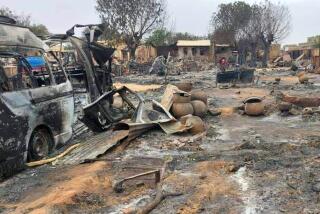Olympics near, China bends on Darfur issue
- Share via
BEIJING — When filmmaker Steven Spielberg announced last month that he was withdrawing as an artistic advisor to the 2008 Olympics over violence in Darfur, the reaction in Beijing was righteous indignation.
Organizers accused him of violating the Olympic spirit by injecting politics into the Games, while the state-run media unleashed a torrent of insults, calling him naive, vain and childish.
Now China is taking a new tack.
After its initial outburst, the Foreign Ministry has launched something of a charm offensive to convince the international community that it does indeed care about human rights. In recent weeks, Beijing has been pushing the Sudanese government to accept a peacekeeping force in its troubled Darfur region. A senior Chinese diplomat who had just returned from a trip to Sudan was trotted out Friday for a rare briefing with foreign correspondents on China’s role in Sudan.
“We are using our relationship with the Sudanese government to exert leverage,” said Liu Guijin at the briefing. “China has done many positive things which have been recognized by the international community.”
The 62-year-old diplomat, one of the most seasoned Africa hands in the Chinese diplomatic corps, conveyed the same message in a recent swing through London and Paris on his way home from Sudan. His job appears partly to be damage control as human rights advocates around the world threaten to organize a boycott of the 2008 Olympics in Beijing because of China’s close ties with the Sudanese government.
China’s relationship with Sudan as that country deals with the Darfur crisis is being keenly watched as a test case of how China handles itself on the world stage, especially with regard to human rights.
“I think the Chinese, as they become a great power, are realizing that foreign policy is not simply about economics, but about world leadership. There is a gradual evolution as they step into that role,” said Andrew S. Natsios, a Georgetown University professor who until recently was President Bush’s special envoy on Darfur.
Natsios said the Chinese had been unfairly criticized over Darfur when in fact they have been active behind the scenes in getting the Sudanese government to make concessions.
“The Chinese don’t go on moral crusades the way America does. But when you engage with them in a rational, reasonable way, they can be very helpful,” Natsios said.
Despite China’s efforts to defuse the crisis, the criticism is likely to continue in the run-up to the Olympics, which are set to begin Aug. 8.
“These Olympics are a geopolitical debutante ball for China. They are to highlight China’s ascension onto the stage of world power, and that makes it quite reasonable for human rights advocates to highlight what they are doing around the world,” Allyn Brooks-LaSure, spokesman for the Washington-based organization Save Darfur, said in a telephone interview Friday.
China developed a close relationship with Sudan in the 1990s, buying up to two-thirds of its oil output. Since 2003, when fighting broke out in Darfur, China has used its U.N. Security Council presence to block tougher sanctions against Sudan and has ignored an arms embargo. Weapons sold by China are believed to have ended up in the hands of government-backed militias that have been terrorizing villagers in Darfur.
In May, Liu was appointed special envoy on the Darfur issue. He has since made four trips to Sudan, and met with various principals in the conflict.
Armed with a dossier of reports, Liu reeled off China’s accomplishments at the 70-minute briefing Friday for the foreign media. He said a team of 140 engineers had dug wells and built infrastructure for refugees in Darfur. He cited studies showing that the United States sells far more weapons to developing countries, although he did not dispute that China continues to supply arms to the Sudanese government.
Asked whether “genocide” was occurring in Darfur, Liu responded, “I don’t like to debate with people what words should be used to describe what has happened, which has caused the displacement of millions of people and cost tens of thousands of lives.”
He also said that rebel groups should be held as responsible as the Sudanese government for the violence and that the international community should pressure them as well to accept a cease-fire.
In his travels, Liu has met with human rights groups, and he spent an hour with Spielberg in September.
“I respect Mr. Spielberg as an individual. He was very polite and appreciative of what I was talking about,” Liu said. “Later, when he resigned, it was a very big surprise to me.”
In his resignation statement, Spielberg said, “While China’s representatives have conveyed to me that they are working to end the terrible tragedy in Darfur, the grim realities of the suffering continue unabated.”
His resignation coincided with an open letter signed by dozens of prominent politicians, artists, writers and athletes urging China to do more on Darfur. The signatories included eight Nobel Peace Prize winners.
--
More to Read
Sign up for Essential California
The most important California stories and recommendations in your inbox every morning.
You may occasionally receive promotional content from the Los Angeles Times.










